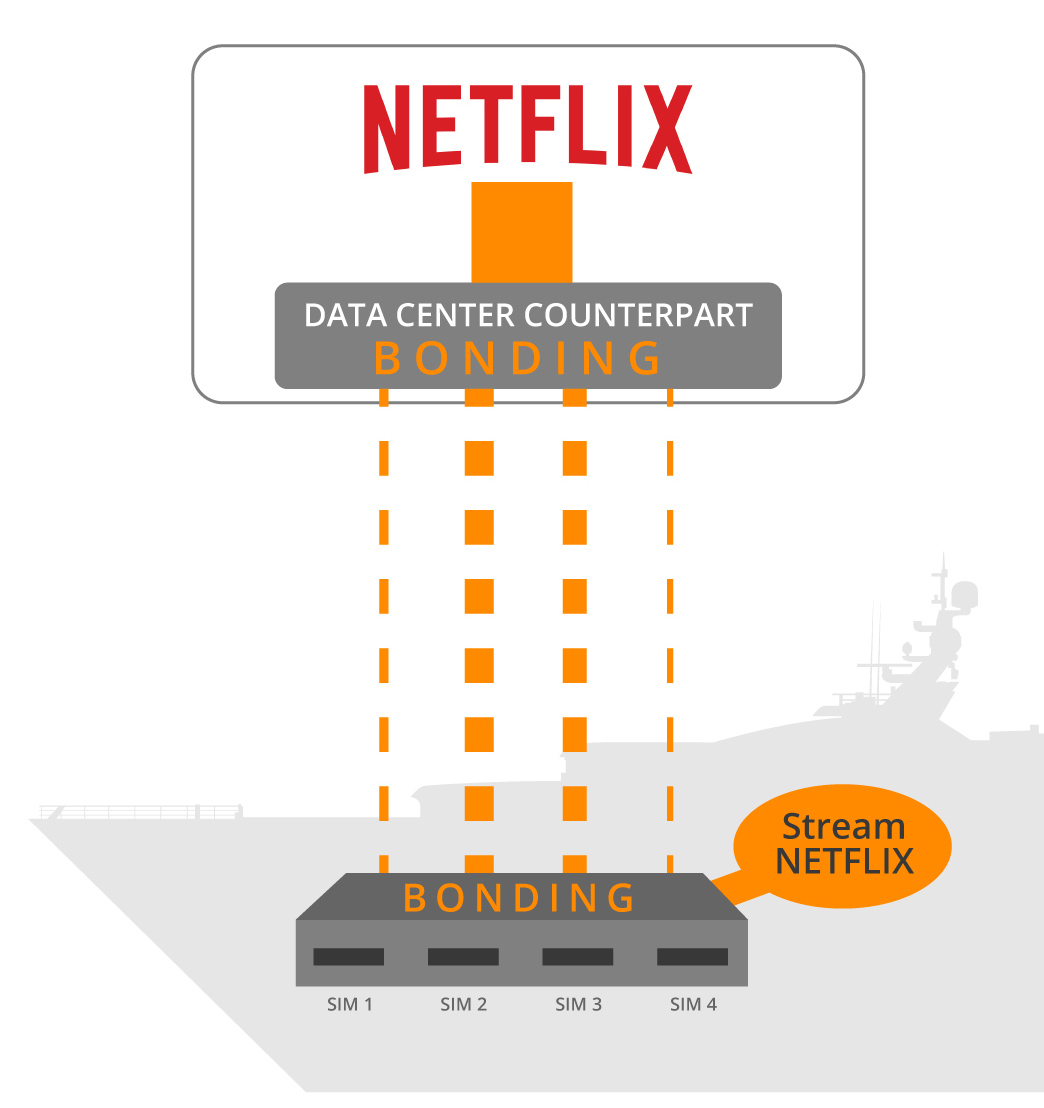Connection Bonding

How bonding works
How bonding works
(Also known as "connection aggregation")
In 2013 Meridian 5G pioneered connection
bonding technology that allows merging four 4G/5G connections (using 4 SIM cards) into one superfast
secure stream. The result is a very fast, stable and secure 4G/5G internet connection.
An additional benefit of connection bonding is that it provides a static dedicated
IP address required to stream country-specific content (US or UK Netflix, BBC player etc).
How does connection bonding work?
The connection aggregation requires multiple modems (multiple SIM cards). Given
that signal quality of every connection (SIM card) constantly fluctuates we found that merging 4
connections allows to achieve the most reliable connection, even in busy ports with overloaded networks.
Hence our devices have 4 modems in them.
When the users onboard send a request (stream
movies, google, or have a video call) the device onboard splits every request into thousands of packets
and sends it via all 4 connections, depending on how much load each connection can handle at that point
in time.
That request arrives in pieces via all 4 connections to the Data Centre where a counterpart
of the onboard device puts the request back together and sends it to Google, Facebook, Netflix etc
(content providers).
We strategically position our data centres in the main internet hubs close
to the data centres used by major content providers. As a result, we get a faster response that then is
communicated back to the boat via all 4 connections and put back together by the device onboard.
Why to bond connection?
There are multiple reasons why it helps to aggregate the connection. One simple
advantage that using multiple connections provides is more bandwidth that allows more internet
load. In the perfect 4G/5G coverage areas this would be the main benefit for a superyacht that
usually has more traffic than any single mobile phone user.
With that said, a superyacht
is rarely in the perfect 4G/5G coverage areas and with many factors that come into play affecting
4G/5G performance a properly equipped superyacht can derive a number of other benefits from connection
aggregation.
Busy ports
The signal quality of every 4G/5G connection constantly fluctuates. To illustrate,
your mobile phone's connection is not the same at all times. Sometimes it is stronger,
sometimes weaker. Such fluctuations become more apparent in busy ports with overloaded
networks (an extreme example is the Monaco Yacht Show). Signal quality changes every
second and limits the internet speed possible if only one SIM card is used.
However, if you have two mobiles next to each other, even if they connect to the
same cellular tower - chances are one mobile would have a stronger connection than
the other. Through extensive testing, we established that by using 4 connections
(4 SIM cards) and aggregating those into one we can virtually neutralize signal
fluctuations that every single modem is so vulnerable to.
For that reason,
Meridian 5G's technology allows the use of four SIM cards in one device and merges
four connections into one. As a result, all internet traffic routed via 4G/5G is
communicated through all 4 connections, taking into account how much load each
connection can take at any given time. This allows to use the bandwidth of each
connection to the fullest extent possible at all times.
To illustrate,
imagine that you are streaming a movie. With connection aggregation, you will be
able to stream that movie via all 4 SIM cards simultaneously. So if one card's
signal gets weaker chances are the other three will have a better signal or in
the very least compensate with more bandwidth combined.
Bonding vs Load balancing
"Connection aggregation" is not the same as "load balancing". Load balancing is a very common approach used by many commercial 4G/5G routers that allow the use of multiple SIM cards (Pepwave etc). Load balancing simply allows the device to spread the load (internet requests) evenly between several connections (SIM cards). The limitation of that approach is that if you are streaming a movie or having a video chat you will still end up using a connection of one SIM card only, being at mercy of the fluctuating signal.
Network selection
Our devices allow using SIM cards of the same or different cellular operators.
However, we rarely recommend using cards from different operators. Using cards
from different operators helps if you have standard basic SIM data contracts,
cruise in areas covered by multiple cellular operators and look to avoid blind
spots.
This is usually not the best solution for a superyacht as this is
counterproductive for connection aggregation (you cannot aggregate a connection
that you do not have if your contract leaves one of your cards "blind" in a certain
area).
The solution is to use proper SIM data contracts that don't go blind (or get throttled
on roaming), and then use a device that can select the best network for all sim cards at
any given point in time.
The description of the best network in this example
is the network that can provide the fastest internet speed, not simply the strongest
signal (highest number of bars) that most commercial devices tend to default to.
Security
Our technology breaks the user's request down into thousands of packets, encrypts
each packet and sends the request in random data packet combinations via all 4
connections.
To make a simplified illustration, imagine googling the word
"Superyacht". If every letter was a packet then the technology would first encrypt
every letter with a high-grade AES, and then send letters S, E, R, C and H via one
connection (probably the stronger one out of the four). Letters U, Y and C via
another connection. And the rest of the letters via the remaining two, based on
how much capacity every connection has.
The result is a military grade double
layer encryption.

How bonding works
How bonding works